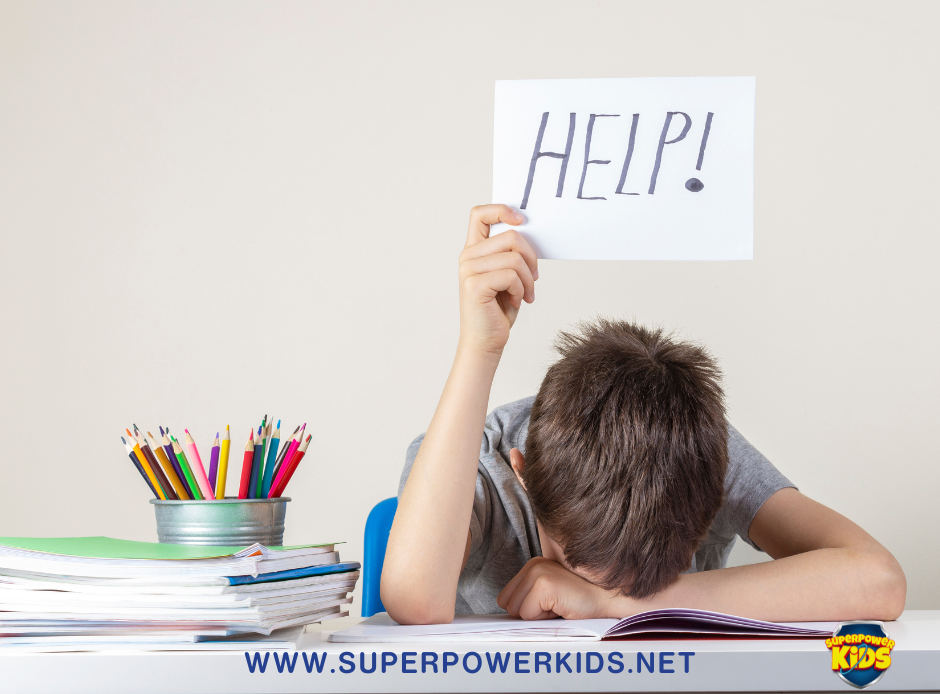
Dyslexia is a learning disorder affecting a person’s reading, writing, and spelling ability. It is a neurological condition believed to be caused by a difference in how the brain processes language. It is not related to intelligence and is not caused by a lack of motivation or poor teaching.
Symptoms of dyslexia can vary, but some common signs include difficulty with reading, spelling, and writing. Children may also have trouble with phonics, rhyming, and decoding words. They may also struggle with listening comprehension and have difficulty remembering sequences or following directions.
Here are some specific signs that may indicate dyslexia in children:
- Difficulty learning the alphabet and letter sounds.
- Difficulty sounding out words or recognising words by sight.
- Struggling to blend sounds to make words.
- Problem with reading fluency, such as slow or choppy reading.
- Inability to read words accurately despite having been taught the sounds they represent
- Difficulty remembering the sequence of events in a story or the order of letters in a word.
- Struggling to understand what they have read.
- Difficulty with handwriting and letter formation.
- Difficulty with spelling and writing.
- Struggling with math concepts, such as counting, number recognition, and basic arithmetic.
It’s important to note that these signs may indicate other learning difficulties or disorders, and a thorough evaluation by a professional is necessary for a proper diagnosis.
If you suspect that your child may have dyslexia, it is crucial to have them evaluated by a professional. A comprehensive assessment can help determine if your child has dyslexia and what support they may need.
There are several effective interventions for dyslexia, including phonics-based reading instruction, multi-sensory teaching methods, and assistive technology. These interventions can help children with dyslexia learn to read, write, and spell.
It is also important to provide emotional support for children with dyslexia. Many children with dyslexia struggle with self-esteem and may feel frustrated or discouraged. Parents can help by encouraging their children, praising their efforts and progress, and helping them to find ways to use their strengths and talents.
Is my child lazy?
It is important to understand that dyslexia is a neurological condition that affects a person’s ability to process language and is not a result of a lack of intelligence or laziness. Children with dyslexia may have difficulty reading, writing, and spelling, but this does not mean they are lazy. On the contrary, they may work harder than their peers and still struggle to keep up with their reading, writing, and spelling.
It is also important to note that dyslexia can co-occur with other conditions, such as ADHD, making it difficult for a child to stay focused and follow through with tasks. An evaluation by a professional, such as a neuropsychologist or an educational psychologist, can help to determine if a child has dyslexia or any other conditions that may be affecting their learning.
It’s important to give them extra support and encouragement and let them know that they are not alone and can overcome the challenges of dyslexia. With the proper help and interventions, your child can learn to read, write, and spell successfully.
How can a dyslexic child be intelligent if they struggle to read?
Dyslexia is a neurological condition that affects a person’s ability to process language, specifically reading, writing and spelling. It does not have anything to do with a person’s intelligence level. People with dyslexia have normal or above-average intelligence but have difficulty with reading and related language tasks. They may have trouble with decoding, fluency and comprehension, but they still possess the same capacity to learn and understand as those without dyslexia.
Dyslexia is not a reflection of a person’s intelligence but rather their brain’s way of processing language. Many people with dyslexia have strengths in other areas, such as problem-solving, creativity, spatial reasoning, and more. It’s important to remember that dyslexia is not a limitation on intelligence but a different way of processing information. With proper support, people with dyslexia can achieve great success in their academic and professional lives.
How is the processing of information different?
- Phonological Processing: People with dyslexia have difficulty with phonological processing, which is the ability to process the sounds of language. This can make it difficult for them to decode words, which is the process of sounding out words.
- Rapid Automatic Naming (RAN): People with dyslexia may have difficulty with rapid automatic naming (RAN), which is the ability to quickly name items in a category, such as letters, numbers, or objects. This can make it difficult for them to read quickly and fluently.
- Visual Processing: People with dyslexia may have difficulty with visual processing, which is the ability to process visual information. This can make it difficult for them to distinguish between similar letters and words, such as “b” and “d” or “was” and “saw.”
- Working Memory: People with dyslexia may have difficulty with working memory, which is the ability to hold onto and manipulate information in mind. This can make it difficult for them to remember what they read or follow multi-step instructions.
What resources can I use to help my child?
There are many resources available to help children with dyslexia. Here are some examples:
- Tutoring: One-on-one or small group tutoring with a qualified teacher or tutor specialising in dyslexia can provide extra support and help your child improve their reading, writing, and spelling skills.
- Educational software and apps: Many educational software programs and apps can help children with dyslexia improve their reading, writing, and spelling skills. Some popular examples include “Reading Eggs” and “Readability”
- Assistive technology: Assistive technology can help children with dyslexia access and engage with written materials. Examples include text-to-speech software, such as “NaturalReader” or “Balabolka”, and speech recognition software, such as “Dragon Naturally Speaking”
- Books and reading materials: There are many books and reading materials specifically designed for children with dyslexia, with formats and fonts that make them easier to read. Some publishers that specialise in these materials include “Dyslexia Gold” and “Barrington Stoke”
- Support groups: Joining a support group for parents of children with dyslexia can provide a sense of community and allow you to connect with other parents who understand your challenges.
- Professional help: Consultation with a neuropsychologist, educational psychologist, or speech and language therapist can help you to understand your child’s specific needs and develop a personalised plan to support them.
It’s important to involve your child in finding resources that work best for them. Encourage them to participate in selecting and using resources and provide positive feedback for their efforts.
Should I let my child use audiobooks or force them to read?
Whether or not to allow your child to use audio books or to force them to read is a decision that should be based on your child’s individual needs and preferences.
Audiobooks can be an excellent tool for children with dyslexia or other reading difficulties, as they provide an alternative way to access the same material as their peers. They can also be a helpful tool for children struggling with reading fluency or comprehension. Allowing your child to listen to an audiobook can help them build their vocabulary and improve their listening skills, which can benefit their overall language development.
On the other hand, reading is an essential skill for academic success and personal growth. It helps to improve vocabulary, comprehension, critical thinking and memory. Reading also helps children develop a love of learning and can provide a sense of accomplishment and self-esteem.
Therefore, children need to continue to read and practice their reading skills, even if they are also listening to audiobooks.
It is not an either-or decision; you could find a balance between the two. For example, you can encourage your child to listen to audiobooks while also encouraging them to read independently. You could also have them listen to the audiobook first and then have them read the same material. This way, they can build their reading skills and improve their listening skills simultaneously. Additionally, it’s essential to consult with your child’s teacher or educational professional for guidance on what might be most beneficial for your child.
Is there any storybook that explains dyslexia to children?
Yes, some storybooks explain dyslexia to children. These books can help children understand and come to terms with their dyslexia and also help other children understand what it is like to have dyslexia. Here are a few examples:
- “The Alphabet War: A Story About Dyslexia” by Diane Burton Robb: This book tells the story of a child who struggles with reading and writing and how he eventually learns to overcome his difficulties with the help of a special teacher.
- “Dyslexia and Me” by Kate Rowan: This book is written from the perspective of a child with dyslexia and explains what it feels like to have dyslexia, including the difficulties and successes.
- “The Girl Who Could Fly: A Story About Dyslexia” by Christine Darry: This book tells the story of a young girl who discovers her love of flying, despite her struggles with reading and writing.
- “The Secret of the Golden Key” by M. J. Crabb: This book tells the story of a young boy who is struggling with dyslexia and how he discovered a way to read by using a golden key.
- “The Alphabet Tree” by Leo Lionni: This book tells the story of a tree that helps a dyslexic child to read by teaching him the sounds of letters and words.
It’s important to keep in mind that reading these books alone is not enough. Still, rather it can be used as an educational tool along with other interventions provided by professionals. Also, it’s a good idea to discuss with your child after you read the story together to make sure they understand what dyslexia is and that they do not feel alone in their struggles.
What are the best dyslexia services in Australia?
There are several organisations and services in Australia that provide support and resources for individuals with dyslexia. Some of the best dyslexia services in Australia include:
- The Dyslexia-SPELD Foundation (DSF): This organisation provides a range of services for individuals with dyslexia and other specific learning difficulties, including assessments, tutoring, and teacher training. They have offices in most of the states in Australia.
- The Australian Dyslexia Association (ADA): The ADA is a national non-profit organisation that provides information, support, and resources for individuals with dyslexia and their families. They also offer training and professional development for educators and employers.
- The Helen Arkell Dyslexia Centre: This organisation provides assessments, tutoring, and teacher training services for individuals with dyslexia. They also offer parent and teacher workshops and online resources.
- The Smith Family: This organisation offers a range of programs and support services for disadvantaged and marginalised children, including those with dyslexia. They provide educational support, mentoring, and access to technology and resources.
- The Royal Children’s Hospital in Melbourne: The hospital’s “Learning and Behaviour Service” provides assessments and support for children with learning and developmental difficulties, including dyslexia.
It is important to note that these services may have different criteria, eligibility criteria, and fee structures. Therefore, contacting them directly or checking their website is best to see if they can provide the service you need and if they are covered by insurance or government funding.
Related Articles
How to Improve Self-regulation in Children with Autism and Attention Disorders
Proprioceptive Activities for Kids – Improve Behaviour, Self-Regulation and Anxiety




